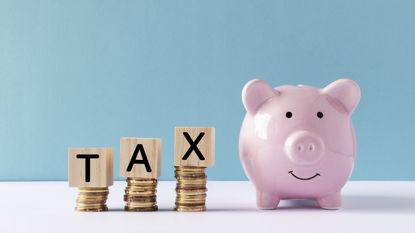Four Steps to Help You Have a Comfortable Retirement
Planning for retirement can be daunting, but the plan is what makes it more likely you’ll get to spend retirement relaxing and doing the things you love.


One of the biggest fears people have when planning for their retirement is running out of money once they get there. Even those who have saved diligently for most of their lives worry whether or not they will be able to live out a comfortable retirement.
According to a recent Bloomberg survey, investors believe they will need at least $3 million in order to retire comfortably. But a comfortable retirement depends on more than just the amount of dollars you have saved. Don’t panic just yet. Here are four steps you can take now to help you enjoy your golden years.

To continue reading this article
please register for free
This is different from signing in to your print subscription
Why am I seeing this? Find out more here

1. Save Early and Often.
Retirement may seem far off if you are just starting your career, but it is never too early to start thinking about and preparing for your financial future. Establishing good money-saving habits early in life will make it easier for you to save throughout your career. Many retirees who are living out a comfortable retirement owe their success to those good early saving habits. Because you are giving yourself more time to save by starting early, you can put away less at a time. Meaning, you don’t always have to choose between saving for retirement and doing something fun with your money.
If you're not sure where to start, a financial adviser can help you map out a plan, which can make the difference between just scraping by and living out a comfortable retirement.

2. Have a Tax Plan.
One of the most important steps on the road to retirement is having a tax plan. This goes beyond simply filing your taxes every year. The further ahead you can plan for your tax situation, the better chance you have at reducing your tax burden.
When it comes to retirement accounts, there are tax-exempt accounts like Roth IRAs and Roth 401(k)s and tax-deferred accounts like 401(k)s or traditional IRAs. Both kinds of accounts are helpful in saving for your retirement. The major difference between the two occurs when taxes are taken out. Those who are just starting out in their careers often rely mostly on tax deferred accounts. These accounts provide an upfront tax break on your initial contributions. The taxes are delayed, or deferred, until you begin taking money out of the account in retirement.
Tax-exempt accounts are the opposite. Rather than paying taxes when you withdraw money, you are instead required to pay taxes on your contributions up front. The contributions you put into these accounts will grow tax-free over time and you will be able to withdraw the money tax-free in retirement. These future tax benefits can be a huge relief for retirees, many of whom will be living on a reduced or fixed income.
Remember to take into account required minimum distributions, or RMDs, which are forced distributions from your tax-deferred accounts like a traditional IRA or 401(k). You must start taking RMDs by April 1 of the year after you turn 73. So, if you celebrate your 73rd birthday in August of this year, then you must take the RMDs by April 1, 2024. Every year after, you must take them by Dec. 31.

3. Assess Your Risk.
Consider the risks you are taking with your investments. For example, if you start the year with $1.25 million in your retirement accounts, it could look a lot different just months later depending on how much risk you're taking on. Ask yourself, what is my comfort level?
We sit down with clients and ask them what their risk number is. Between 1 and 100, with 100 being the most aggressive you can be, where do you fall? If you tell me you are a 40, I would consider you pretty conservative. Do your current investments reflect that risk?
Many people don’t realize that they are invested in a way that is much more aggressive than they are comfortable with. You won’t understand what your risk looks like until you have a plan in place. From there, you can plan out the risk that you are comfortable with.

4. Be Prepared to Shift to Spending.
Once you enter retirement, you transition from being a saver to a spender, and while many people can spend their entire lives being a great saver, they might not know how to handle being a spender in their golden years.
But it is critical you don’t overspend. Spending too much money or racking up credit card debt when you’re still working is bad enough, but at least you have a steady income every month that can help pay it off. In retirement, your income options are much more restricted. Overspending can easily result in running out of money before your retirement ends, which may force you to rejoin the workforce.
Bottom line, the sooner you get started, the better. Planning for retirement can be intimidating and stressful but it doesn’t have to be. Instead of panicking, be proactive and create a plan for your retirement. Working with a financial adviser can help you come up with the right plan for these life-altering decisions.
This article was written by and presents the views of our contributing adviser, not the Kiplinger editorial staff. You can check adviser records with the SEC or with FINRA.
Get Kiplinger Today newsletter — free
Profit and prosper with the best of Kiplinger's advice on investing, taxes, retirement, personal finance and much more. Delivered daily. Enter your email in the box and click Sign Me Up.

Tony Drake is a CERTIFIED FINANCIAL PLANNER™ and the founder and CEO of Drake & Associates in Waukesha, Wis. Tony is an Investment Adviser Representative and has helped clients prepare for retirement for more than a decade. He hosts The Retirement Ready Radio Show on WTMJ Radio each week and is featured regularly on TV stations in Milwaukee. Tony is passionate about building strong relationships with his clients so he can help them build a strong plan for their retirement.
-
 The Secret Credit Card for Amazon Prime Day Shopping
The Secret Credit Card for Amazon Prime Day ShoppingThis "secret" credit card for Amazon Prime Day shopping can maximize your cash back rewards. Plus get a $300 bonus.
By Erin Bendig Published
-
 This Trust Can Protect Your Assets From Long-Term Care Costs
This Trust Can Protect Your Assets From Long-Term Care CostsA Medicaid asset protection trust can help ensure your protected assets go to your beneficiaries rather than your long-term care, but it has to be set up properly.
By Joe F. Schmitz Jr., CFP®, ChFC® Published
-
 This Trust Can Protect Your Assets From Long-Term Care Costs
This Trust Can Protect Your Assets From Long-Term Care CostsA Medicaid asset protection trust can help ensure your protected assets go to your beneficiaries rather than your long-term care, but it has to be set up properly.
By Joe F. Schmitz Jr., CFP®, ChFC® Published
-
 Four Steps to Secure Your Retirement Income
Four Steps to Secure Your Retirement IncomeInstead of relying on selling stock to fund your retirement, consider these actions to safeguard your retirement income.
By Cosmo P. DeStefano Published
-
 Workplace Benefits Can Lighten the Load for Working Parents
Workplace Benefits Can Lighten the Load for Working ParentsFrom wellness programs, help with saving for retirement, college and emergencies and possibly even financial advice, your workplace benefits are there for you.
By Kate Winget Published
-
 How AI Can Help a Lawyer Work Faster and Less Expensively
How AI Can Help a Lawyer Work Faster and Less ExpensivelyArtificial intelligence can quickly find a needle in a haystack of thousands of documents. It also remembers everything it’s read about the law.
By H. Dennis Beaver, Esq. Published
-
 Perpetual-Life Non-Traded REITs: Four Things Investors Should Know
Perpetual-Life Non-Traded REITs: Four Things Investors Should KnowCompanies with good track records oversee the largest perpetual-life non-traded REITs, but there are some structural concerns about the funds to be aware of.
By Matt Sharp Published
-
 Lost Your Way Financially? How to Get Back on Track
Lost Your Way Financially? How to Get Back on TrackMaking even small adjustments to spending and saving habits can make a big difference when it comes to meeting your financial goals.
By Vanessa Okwuraiwe Published
-
 Before Doing a Roth Conversion, Evaluate These Three Thresholds
Before Doing a Roth Conversion, Evaluate These Three ThresholdsTo avoid getting flattened by higher taxes or Medicare premiums related to Roth conversions, make sure you look both ways on your tax rates.
By Evan T. Beach, CFP®, AWMA® Published
-
 Three Ways to Pay Less Taxes to Uncle Sam
Three Ways to Pay Less Taxes to Uncle SamRetirees especially could benefit from these tax-efficient strategies that focus on what you leave your heirs and what kind of accounts your money is in.
By Matt D’Amico Published
